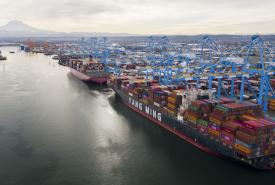The International Maritime Organization (IMO) is warning that thorough checks are needed for bauxite, the primary ore of aluminum, after research found a new way in which the rock can become unstable and cause a vessel to capsize.
Transportation of the rock, amounting to more than 100 million tonnes of material annually, has so far resulted in 18 known deaths after the Bulk Jupiter carrier sank in 2015.
The maritime regulatory body’s warning comes after its sub-committee on Carriage of Cargoes and Containers was presented with research from the Global Bauxite Working Group (GBWG) showing a new process that can cause bauxite to sink a vessel.
A team of industry experts formed the GBWG after the Bulk Jupiter tragedy to study the behaviour of bauxite during shipping.
Its findings have found that bauxite with a large proportion of smaller particles could be subject to a newly-identified phenomenon of “dynamic separation” when there is excess moisture in the cargo.
In such conditions, a slurry can form above the solid material, resulting in the free surface effect of liquid affecting the vessel's stability and leading to the risk of the ship capsizing.
Read 'How to Navigate the Dry Bulk Market', a technical paper by Captain Yusuf Soomro, Marine Consultant, TMC, to discover more about the bulk carrier sector
The IMO’s sub-committee has raised awareness on the potential risks posed by moisture and provided new guidance on the carriage of bauxite aimed at shippers, terminal operators, shipowners, ship operators, charterers, shipmasters and all other entities concerned.
Updates to the International Maritime Solid Bulk Cargoes (IMSBC) Code, the industry rulebook on how to deal with bulk cargoes, aim to help prevent any accidents before the next scheduled adoption of the new test methods and relevant schedules in 2019.
According to the IMO, governments should treat some bauxite cargoes with a larger proportion of smaller particles as a Group A cargo that can liquefy.
It warned: “Excess moisture in such cargoes can lead to a free surface slurry. This can cause atypical motion of the ship.
“The master should take appropriate action in the event of this possible sign of cargo instability.”









